Twenty pairs of skin grafts from identical donor areas were treated with the same wound care protocol, but only one of each pair was treated with BIOPTRON® Hyperlight Therapy. A long-term follow-up was performed after 1, 3, 6 months and 1 year relating to the degree of epithelialisation, several healing parameters, inflammation, the aspect of the early scar tissue and the subjective feeling of the patient. For all variables, significantly better scores were obtained in the donor sites treated with BIOPTRON® Hyperlight compared with those not treated. The results of this study demonstrate that BIOPTRON® Hyperlight Therapy has a beneficial effect on the healing of standardised wounds, resulting in faster epithelialisation and the improved quality of early scar tissue formation.
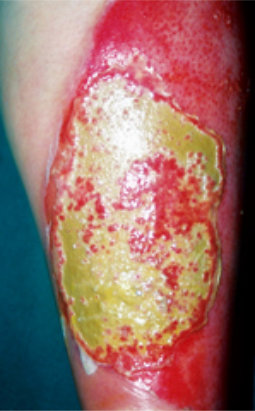
1st day after BLT
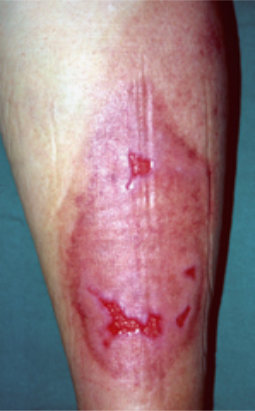
2 weeks after BLT
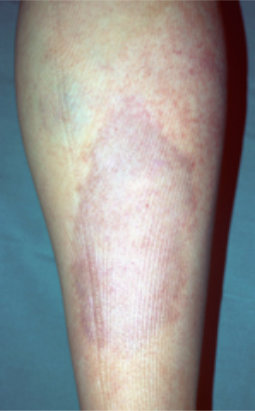
3 months after BLT
Source: Monstrey S, Hoeksema H, Depuydt K, et al. The effect of polarized light on wound healing.
Eur J Plas Surg 2002; 24: 377- 382
The use of BIOPTRON® Hyperlight Therapy on stage 2 and 3 bedsores decreased their surface by at least 30% and in some cases the ulcer healed completely after only 10 treatments (5 days). Stage 4 bedsores showed a decrease of minimum 30% after 15 treatments.
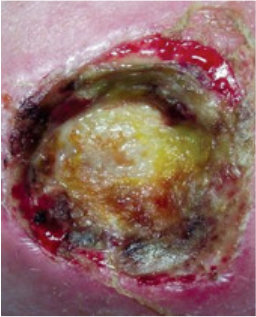
4° pressure ulcer of the greater trochanter area on the day of admission
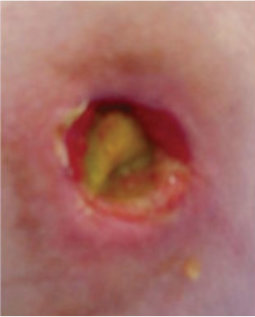
After the course of 15 phototherapy sessions
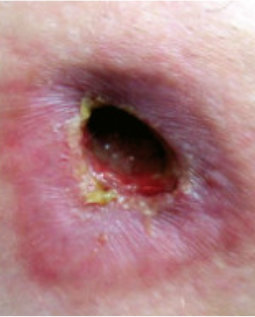
After the course of 30 therapy sessions
Source: Bialozyt et al., April 2018
During 1.5 months, this serious and deep decubitus ulcer in the heel was growing and becoming necrotic. During the first days of BIOPTRON® treatment, the diminution of fibrin and the improvement of ulcer boundaries were evident. Within the first 10 days, the healing of the wound was evident and as it decreased in size. In around 2 months, this severe decubitus ulcer was completely healed.
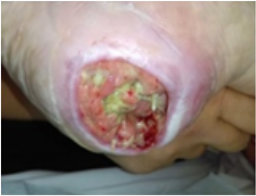
Day 2
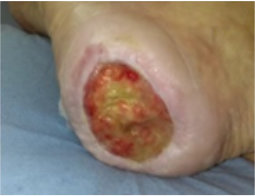
Day 12
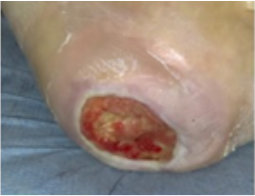
Day 16
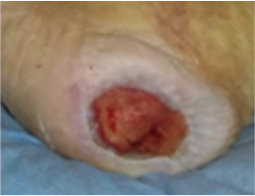
Day 25
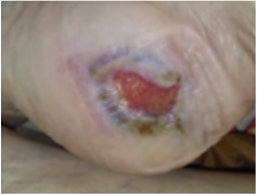
Day 43
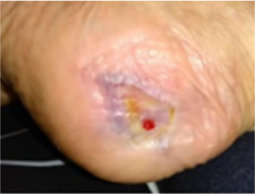
Day 57
Source: Korian Retirement Home, France, 2018
A big bedsore in the buttocks area, existing for about 3 years, was treated with BIOPTRON® once a day for 12 minutes, 5 times a week during one month. The ulcer was healing progressively, diminishing the affected area, as well as in depth. The inflammation of the surrounding tissue was also decreased.
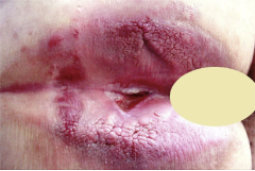
Day 0 (before therapy)
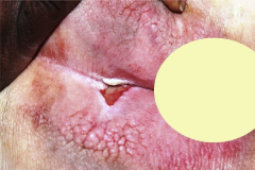
Day 8
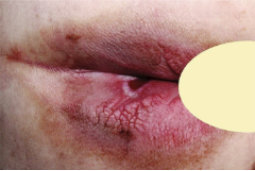
Day 14
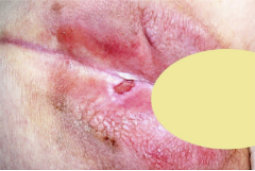
Day 21
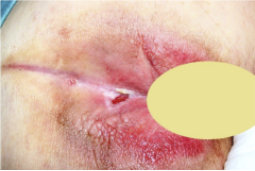
Day 28
Source: Peers Village Retirement Home, Fishhook, (Cape Town, South Africa)
Several ulcers on the leg of the same patient were treated with BIOPTRON®. On day 9 after the start of treatment there was a clear improvement of the ulcer borders, with the presence of healthy scar tissue. The improvement was constant until the patient decided to stop it (Day 21). From that moment, ulcers did not get worse over time, but they did not improve either. BIOPTRON® Therapy was re-started 21 days later. Two days after this new start (Day 2’), the ulcers showed an evident and huge improvement. On day 8 after the new start of treatment (Day 8’), the ulcers were almost closed and the patient did not have pain anymore.
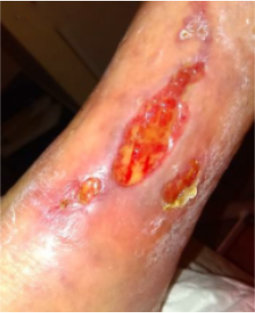
Day 9
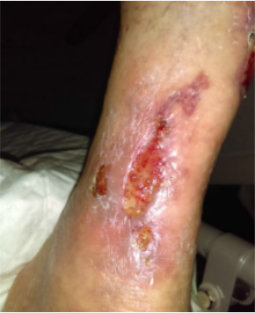
Day 13

Day 27
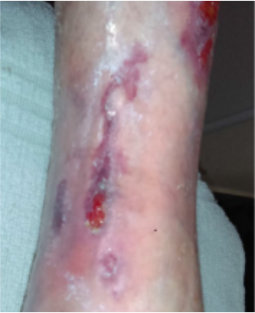
Day 2'
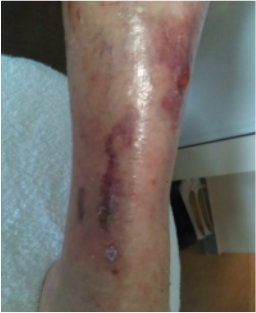
Day 7'
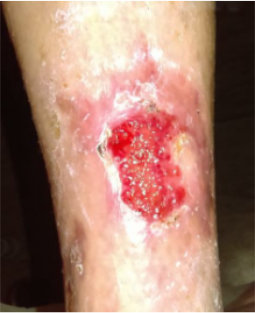
Day 9
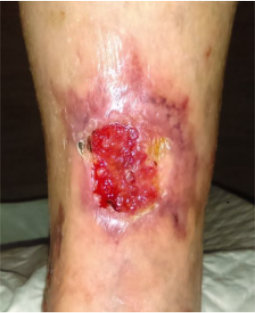
Day 13
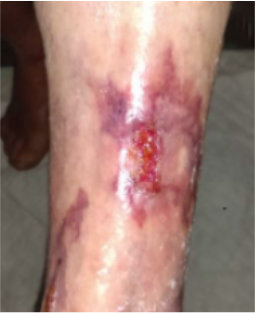
Day 27
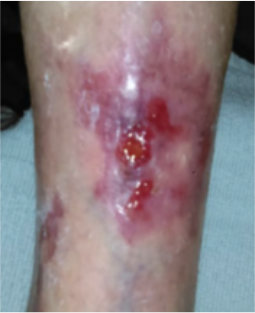
Day 2'
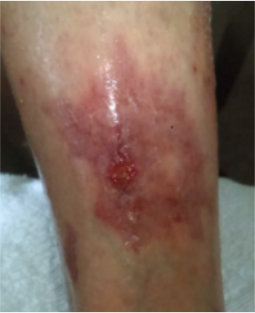
Day 7'
30 patients suffering from cutaneous and mucosal ulcerative lesions were treated with BIOPTRON® Therapy. The pain decreased within the 1st month in 70% of the patients and in 100% of the patients within 3 months. The infections regressed or disappeared in 100% of the cases after the 1st month of treatment. From a histological point of view, the presence of fibrin, clear neovascularization, granulation tissue and the reduction of ulcer borders were observed. After this study, the authors decided to change their protocol for ulcer treatment, in which BIOPTRON® Therapy was applied to the lesion during all the phases of dressing. The protocol was called “On the Wound”.
Source: Aragona et al., 2017 & Korian Retirement Home, France, 2018
A little girl suffered from several burns caused by a hot cooking plate. BIOPTRON® Hyperlight was applied directly on the hand for 2 weeks. The progression of burns shows the healing over a 2-week period of BIOPTRON® Hyperlight treatment. The skin under the burn wound regenerated very fast and was looking very good, allowing the patient to recover very quickly.
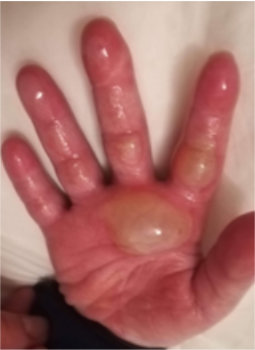
Phase 1 (beginning of therapy)
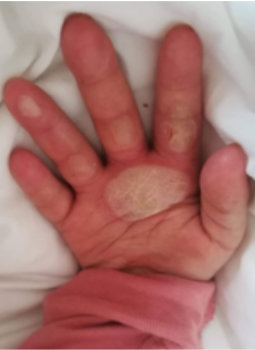
Phase 2
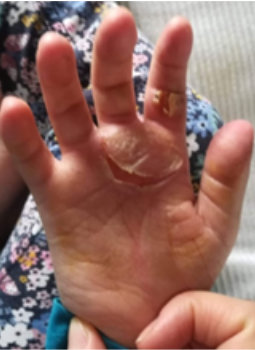
Phase 3
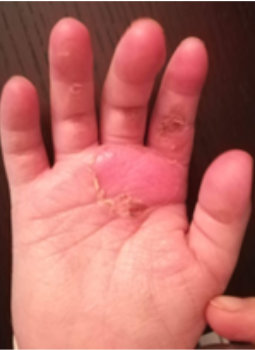
Phase 4
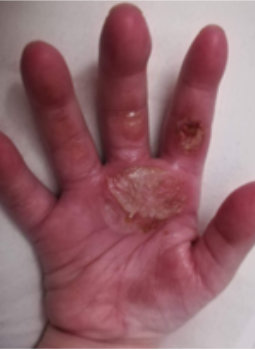
Phase 5
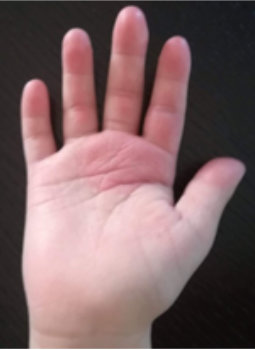
Phase 6 (two weeks later)
Source: Romania Hospital, 2019